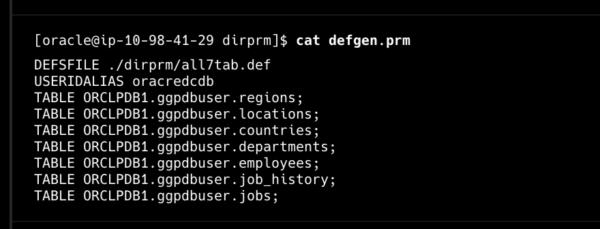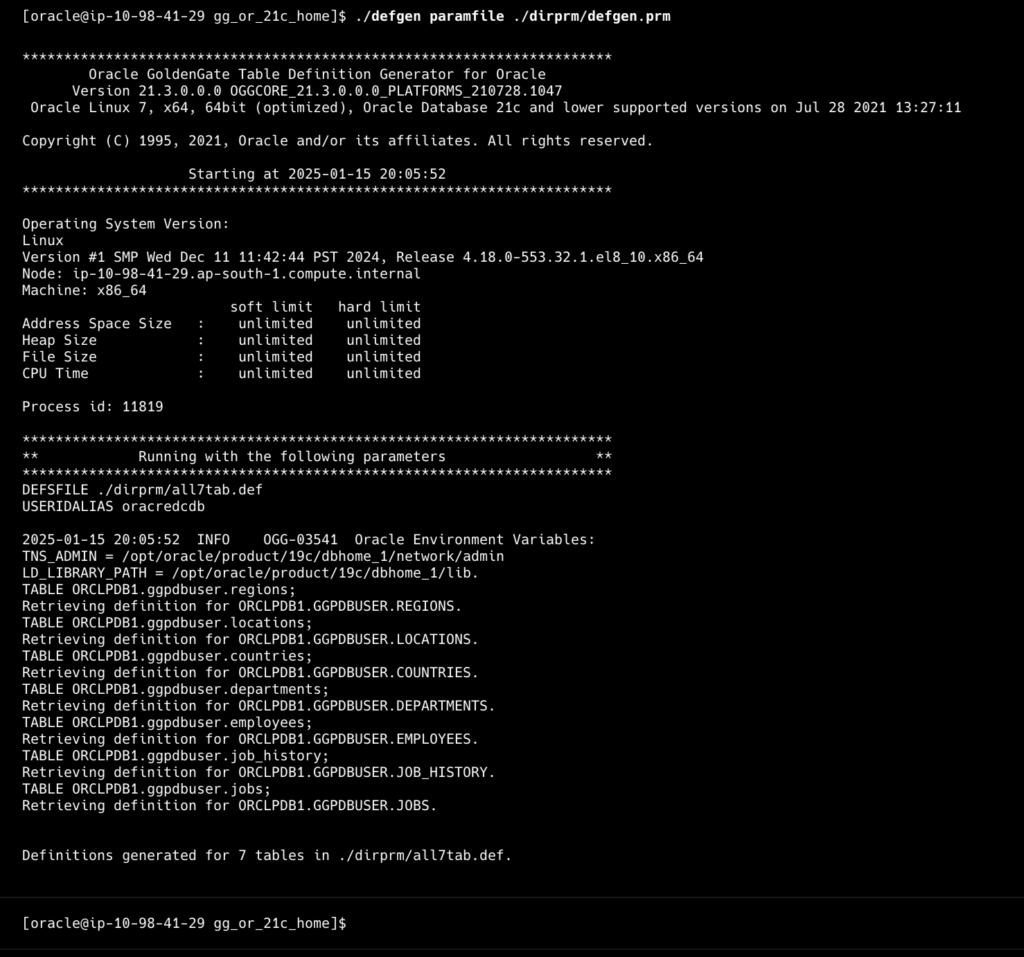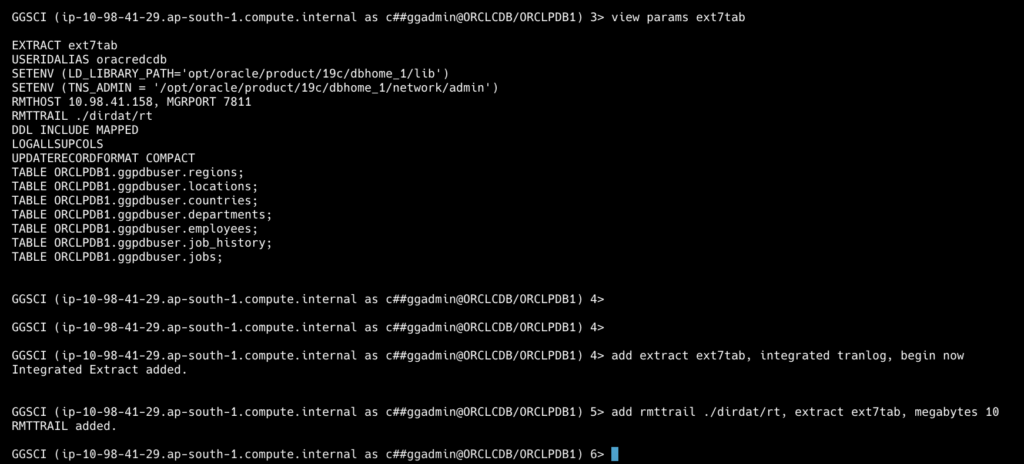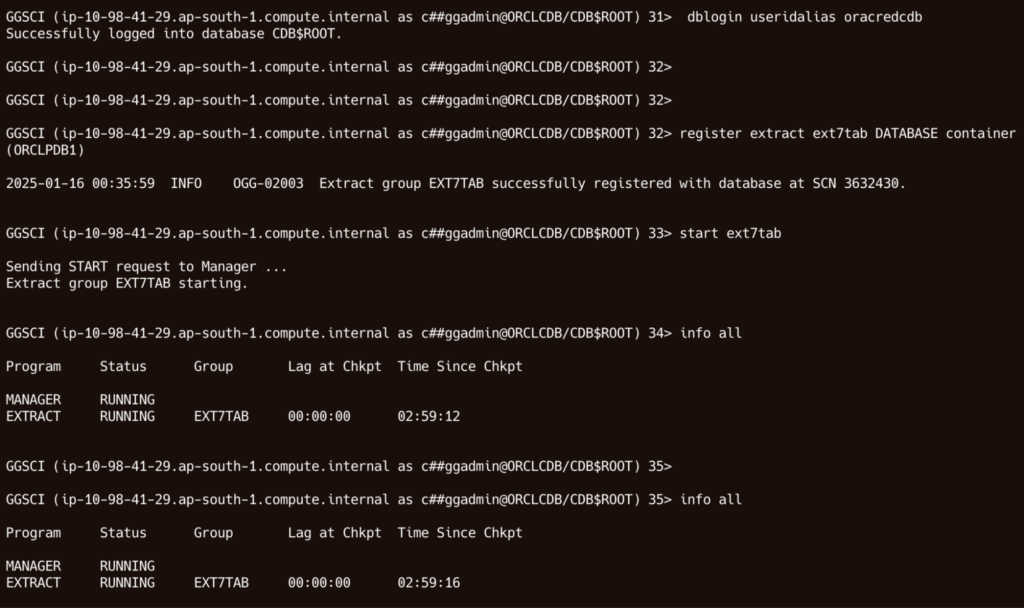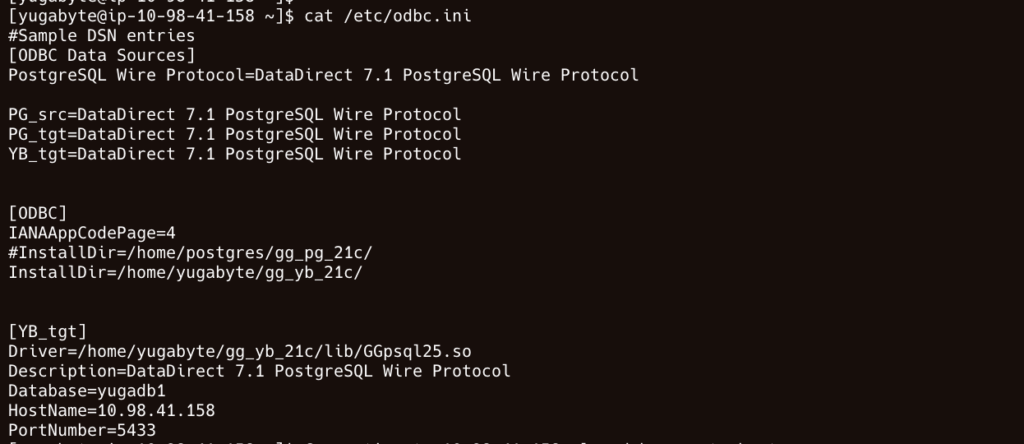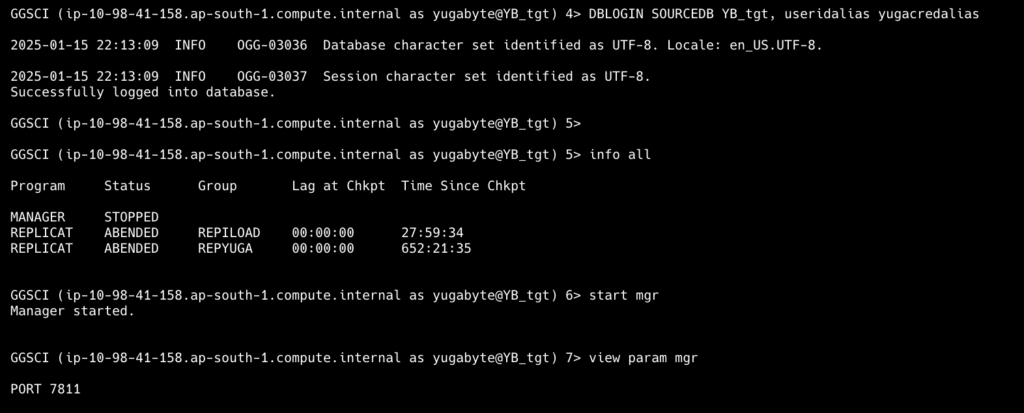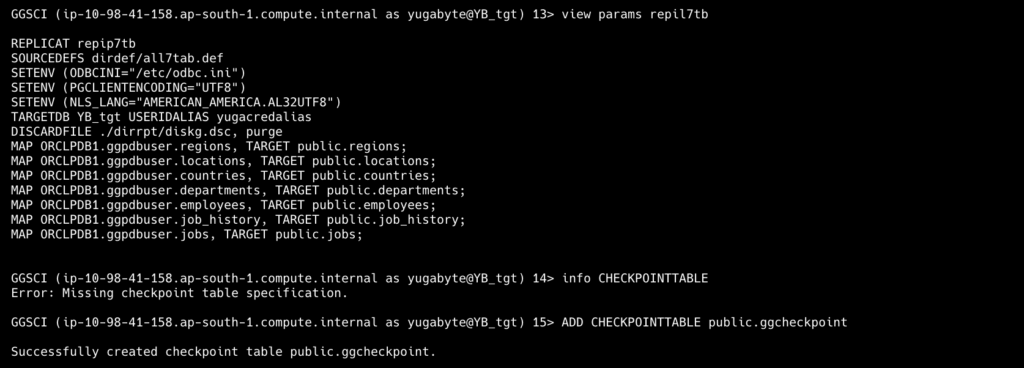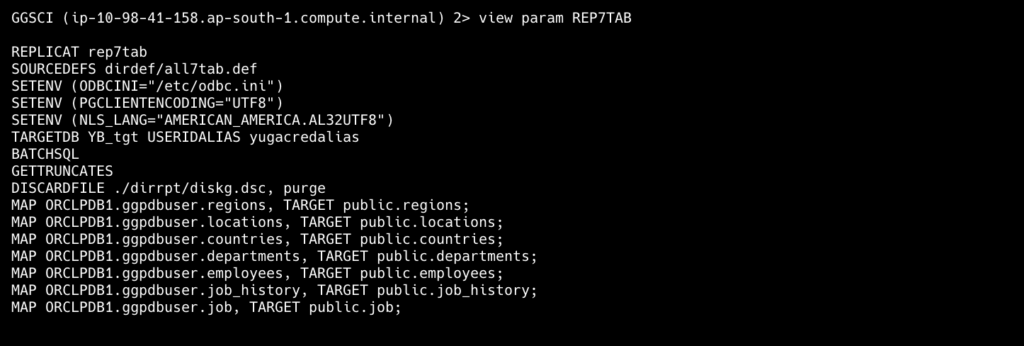Seamless Data Replication from Oracle to YugabyteDB With GoldenGate
A key requirement when migrating data between platforms is to have as little downtime as possible. Oracle GoldenGate is a tried and proven data replication tool that replicates data from one source to another in real-time.
In this blog, we demonstrate how GoldenGate can seamlessly perform data replication from Oracle Database to PostgreSQL-compatible YugabyteDB.
Integrating YugabyteDB and GoldenGate
YugabyteDB is an open source distributed SQL database that delivers global data distribution, resilience, scalability, and enterprise features.
The source and target environments detailed below use the following versions of YugabyteDB and GoldenGate software.
Source system
Oracle Database 19c on Linux
GoldenGate 21c for Oracle database
Target system
YugabyteDB v2024.2.0.0 on Linux
GoldenGate 21c for PostgreSQL
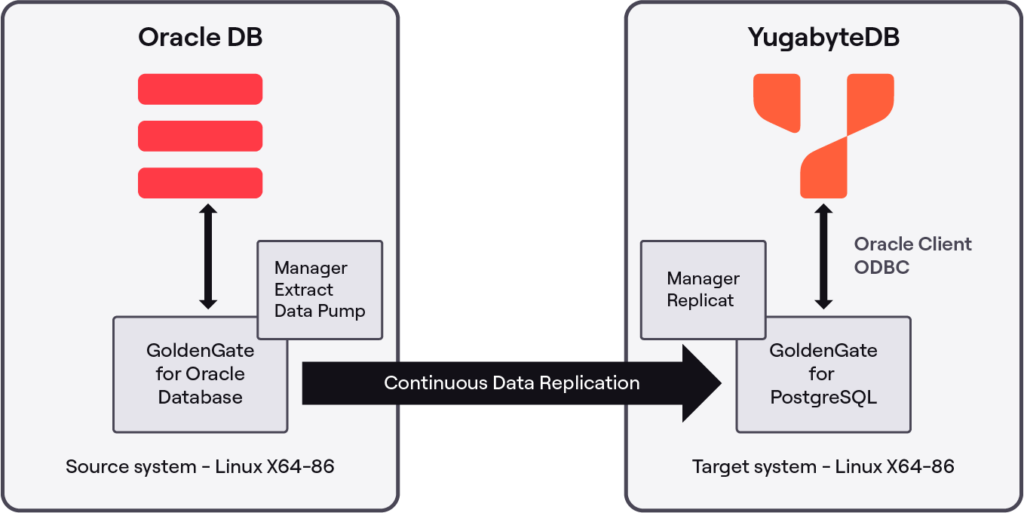
For demonstration purposes, we installed GoldenGate on the database host machines only. You can deploy it on remote/dedicated machines for your production environments.
To demonstrate data replication here, we need to migrate a schema called “ggpdbuser” that resides under a PDB (pluggable database) named “ORCLPDB1” to the target YugabyteDB database named “yugadb1”.
Source Database Details
PDB Name – ORCLPDB1
Schema Name – ggpdbuser
Tables to be migrated: There are seven tables under the “ggpdbuser” schema, listed below:
- regions
- locations
- countries
- departments
- employees
- job_history
- jobs
Target Database Details
DB Name – yugadb1
Schema Name – public
User Name – yugabyte
Table structure migration: This is the first and most important step to take before setting up real-time data replication. Oracle GoldenGate doesn’t have a feature to migrate the table structure between heterogeneous databases, so you will need to carefully check and understand the source table definition and convert it into the required target database format.
You can use GoldenGate to perform the initial data load and continuous data replication once the corresponding table structure is ready in the target database. You must create a primary key for each table to better manage data synchronization and to avoid conflicts during replication.
Before getting started with the GoldenGate replication setup, we have created all seven tables in the target “yugadb1”.
How to Set Up Real-Time Replication
Follow the high-level steps below to set up real-time replication.
On the source side:
- Create GoldenGate user c##ggadmin (common user in case of Container DB) and grant required permission to goldengate extract user
- Set/enable required parameters in the database
- Create a defgen file for all seven tables and transfer them to target side
- Create Credentialstore and add credentials to GoldenGate
- Login to the source database (PDB) from the GoldenGate console using goldengate user credentials and start manager process
- To perform the initial load, create initial-load extract process
- Capture the database SCN number
- Create data-pump extract for real-time data capture and register it to PDB
- Start running initial-load extract
- Start real-time data extract process
On the target side:
- Setting up ODBC configuration for YugabyteDB
- Log-in to the source database from the GoldenGate console using goldengate user credentials and start manager process
- Create and run initial-load replicat process
- Configure and start the real-time data replicate process from the target SCN captured
Now, let’s get started with our configuration
Source Side Configuration
- Create goldengate replication user c##ggadmin (common user in case of Container DB) and grant the required permissions.
SQL> create user C##GGADMIN identified by ggadmin; SQL> grant resource to c##ggadmin; SQL> grant create session to c##ggadmin; SQL> grant create view to c##ggadmin; SQL> grant create table to c##ggadmin; SQL> grant connect to c##ggadmin CONTAINER=all; SQL> grant alter system to c##ggadmin; SQL> grant alter user to c##ggadmin; SQL> alter user c##ggadmin set container_data=all container=current; SQL> alter user c##ggadmin quota unlimited on gg_data; SQL> grant select any dictionary to c##ggadmin; SQL> grant select any transaction to c##ggadmin; SQL> exec dbms_goldengate_auth.grant_admin_privilege('c##ggadmin’,container=>'all'); SQL> grant dv_goldengate_admin; ——— for data vault user SQL> grant dv_goldengate_redo_ACCESS; —— for data vault user - Enable the required parameters in the database.
SQL> alter database add supplemental log data; Database altered. SQL> alter system set enable_goldengate_replication=TRUE; System altered.
Create a defgen file for all seven tables.
The defgen file is required when the source and target table structure are different, mostly when configuring data replication between heterogeneous databases.
[oracle@ip-10-98-41-29 dirprm]$ cat defgen.prm DEFSFILE ./dirprm/all7tab.def USERIDALIAS oracredcdb TABLE ORCLPDB1.ggpdbuser.regions; TABLE ORCLPDB1.ggpdbuser.locations; TABLE ORCLPDB1.ggpdbuser.countries; TABLE ORCLPDB1.ggpdbuser.departments; TABLE ORCLPDB1.ggpdbuser.employees; TABLE ORCLPDB1.ggpdbuser.job_history; TABLE ORCLPDB1.ggpdbuser.jobs; [oracle@ip-10-98-41-29 dirprm]$ [oracle@ip-10-98-41-29 gg_or_21c_home]$ ./defgen paramfile ./dirprm/defgen.prm *********************************************************************** Oracle GoldenGate Table Definition Generator for Oracle Version 21.3.0.0.0 OGGCORE_21.3.0.0.0_PLATFORMS_210728.1047 Oracle Linux 7, x64, 64bit (optimized), Oracle Database 21c and lower supported versions on Jul 28 2021 13:27:11 Copyright (C) 1995, 2021, Oracle and/or its affiliates. All rights reserved. Starting at 2025-01-15 20:05:52 *********************************************************************** Operating System Version: Linux Version #1 SMP Wed Dec 11 11:42:44 PST 2024, Release 4.18.0-553.32.1.el8_10.x86_64 Node: ip-10-98-41-29.ap-south-1.compute.internal Machine: x86_64 soft limit hard limit Address Space Size : unlimited unlimited Heap Size : unlimited unlimited File Size : unlimited unlimited CPU Time : unlimited unlimited Process id: 11819 *********************************************************************** ** Running with the following parameters ** *********************************************************************** DEFSFILE ./dirprm/all7tab.def USERIDALIAS oracredcdb 2025-01-15 20:05:52 INFO OGG-03541 Oracle Environment Variables: TNS_ADMIN = /opt/oracle/product/19c/dbhome_1/network/admin LD_LIBRARY_PATH = /opt/oracle/product/19c/dbhome_1/lib. TABLE ORCLPDB1.ggpdbuser.regions; Retrieving definition for ORCLPDB1.GGPDBUSER.REGIONS. TABLE ORCLPDB1.ggpdbuser.locations; Retrieving definition for ORCLPDB1.GGPDBUSER.LOCATIONS. TABLE ORCLPDB1.ggpdbuser.countries; Retrieving definition for ORCLPDB1.GGPDBUSER.COUNTRIES. TABLE ORCLPDB1.ggpdbuser.departments; Retrieving definition for ORCLPDB1.GGPDBUSER.DEPARTMENTS. TABLE ORCLPDB1.ggpdbuser.employees; Retrieving definition for ORCLPDB1.GGPDBUSER.EMPLOYEES. TABLE ORCLPDB1.ggpdbuser.job_history; Retrieving definition for ORCLPDB1.GGPDBUSER.JOB_HISTORY. TABLE ORCLPDB1.ggpdbuser.jobs; Retrieving definition for ORCLPDB1.GGPDBUSER.JOBS. Definitions generated for 7 tables in ./dirprm/all7tab.def. [oracle@ip-10-98-41-29 gg_or_21c_home]$

Transfer all7tab.def file to the target server.- Add target container and pluggable database credentials to the GoldenGate CREDENTIALSTORE and log-in to the database via the GoldenGate console.
Add the target database credential to CREDENTIALSTORE and log-in to the target database via the GoldenGate console.
- Start manager process.
GGSCI> dblogin useridalias oracredalias Successfully logged into database ORCLPDB1. GGSCI> view param mgr PORT 7809 GGSCI> start mgr Manager started.

- To perform initial-load, create an initial-load extract process.
GGSCI> view params expil7tb EXTRACT expil7tb USERIDALIAS oracredcdb SETENV (LD_LIBRARY_PATH='opt/oracle/product/19c/dbhome_1/lib') SETENV (TNS_ADMIN = '/opt/oracle/product/19c/dbhome_1/network/admin') RMTHOST 10.98.41.158, MGRPORT 7811 RMTFILE ./dirdat/il, maxfiles 999999, megabytes 190, append TABLE ORCLPDB1.ggpdbuser.regions; TABLE ORCLPDB1.ggpdbuser.locations; TABLE ORCLPDB1.ggpdbuser.countries; TABLE ORCLPDB1.ggpdbuser.departments; TABLE ORCLPDB1.ggpdbuser.employees; TABLE ORCLPDB1.ggpdbuser.job_history; TABLE ORCLPDB1.ggpdbuser.jobs; GGSCI> add extract expil7tb, sourceistable Extract added.
The screenshot below shows the created initial-load extract parameter file “expil7tb.”

- Capture the database SCN number before starting the extract process.
SQL> select current_scn from v$database; CURRENT_SCN ----------- 3625429
- Configure the Extract process named “ext7tab” for change data capture (CDC).
GGSCI> view params ext7tab EXTRACT ext7tab USERIDALIAS oracredcdb SETENV (LD_LIBRARY_PATH='opt/oracle/product/19c/dbhome_1/lib') SETENV (TNS_ADMIN = '/opt/oracle/product/19c/dbhome_1/network/admin') RMTHOST 10.98.41.158, MGRPORT 7811 RMTTRAIL ./dirdat/rt DDL INCLUDE MAPPED LOGALLSUPCOLS UPDATERECORDFORMAT COMPACT TABLE ORCLPDB1.ggpdbuser.regions; TABLE ORCLPDB1.ggpdbuser.locations; TABLE ORCLPDB1.ggpdbuser.countries; TABLE ORCLPDB1.ggpdbuser.departments; TABLE ORCLPDB1.ggpdbuser.employees; TABLE ORCLPDB1.ggpdbuser.job_history; TABLE ORCLPDB1.ggpdbuser.jobs; GGSCI> add extract ext7tab, integrated tranlog, begin now Integrated Extract added.

- Start running the initial-load extract, named “expil7tb” in our demo.
GGSCI> start expil7tb Sending START request to Manager ... Extract group EXPIL7TB starting.

- Start the CDC extract process “ext7tab”
GGSCI> dblogin useridalias oracredcdb Successfully logged into database CDB$ROOT. GGSCI> register extract ext7tab DATABASE container(ORCLPDB1) 2025-01-16 00:35:59 INFO OGG-02003 Extract group EXT7TAB successfully registered with database at SCN 3632430. GGSCI> start ext7tab Sending START request to Manager ... Extract group EXT7TAB starting. GGSCI> info all Program Status Group Lag at Chkpt Time Since Chkpt MANAGER RUNNING EXTRACT RUNNING EXT7TAB 00:00:00 02:59:12

Target Side Configuration
- Create the target database ODBC configuration. Oracle GoldenGate supports connectivity via an ODBC driver so we can use the PostgreSQL ODBC driver to connect to YugabyteDB.
[yugabyte@ip-10-98-41-158 ~]$ cat /etc/odbc.ini #Sample DSN entries [ODBC Data Sources] PostgreSQL Wire Protocol=DataDirect 7.1 PostgreSQL Wire Protocol PG_src=DataDirect 7.1 PostgreSQL Wire Protocol PG_tgt=DataDirect 7.1 PostgreSQL Wire Protocol YB_tgt=DataDirect 7.1 PostgreSQL Wire Protocol [ODBC] IANAAppCodePage=4 #InstallDir=/home/postgres/gg_pg_21c/ InstallDir=/home/yugabyte/gg_yb_21c/ [YB_tgt] Driver=/home/yugabyte/gg_yb_21c/lib/GGpsql25.so Description=DataDirect 7.1 PostgreSQL Wire Protocol Database=yugadb1 HostName=10.98.41.158 PortNumber=5433 [yugabyte@ip-10-98-41-158 ~]$

- Connect to the target database via ODBC handle [YB_tgt] from the GoldenGate console and start the manager process.
To log-in to the target YugabyteDB database (yugadb1), you must first add and generate credentials in the GoldenGate credential store.GGSCI> DBLOGIN SOURCEDB YB_tgt, useridalias yugacredalias 2025-01-15 22:13:09 INFO OGG-03036 Database character set identified as UTF-8. Locale: en_US.UTF-8. 2025-01-15 22:13:09 INFO OGG-03037 Session character set identified as UTF-8. Successfully logged into database. GGSCI> GGSCI> info all Program Status Group Lag at Chkpt Time Since Chkpt MANAGER STOPPED GGSCI> start mgr Manager started. GGSCI> view param mgr PORT 7811

Configure initial-load replicat process “repil7tb”
GGSCI> view params repil7tb REPLICAT repip7tb SOURCEDEFS dirdef/all7tab.def SETENV (ODBCINI="/etc/odbc.ini") SETENV (PGCLIENTENCODING="UTF8") SETENV (NLS_LANG="AMERICAN_AMERICA.AL32UTF8") TARGETDB YB_tgt USERIDALIAS yugacredalias DISCARDFILE ./dirrpt/diskg.dsc, purge MAP ORCLPDB1.ggpdbuser.regions, TARGET public.regions; MAP ORCLPDB1.ggpdbuser.locations, TARGET public.locations; MAP ORCLPDB1.ggpdbuser.countries, TARGET public.countries; MAP ORCLPDB1.ggpdbuser.departments, TARGET public.departments; MAP ORCLPDB1.ggpdbuser.employees, TARGET public.employees; MAP ORCLPDB1.ggpdbuser.job_history, TARGET public.job_history; MAP ORCLPDB1.ggpdbuser.jobs, TARGET public.jobs; GGSCI> info CHECKPOINTTABLE Error: Missing checkpoint table specification. GGSCI> ADD CHECKPOINTTABLE public.ggcheckpoint Successfully created checkpoint table public.ggcheckpoint. GGSCI> add replicat repil7tb, exttrail ./dirdat/il checkpointtable public.ggcheckpoint Replicat added.


- Configure the replicat process “rep7tab” for real-time data replication.
GGSCI> view params rep7tab REPLICAT rep7tab SOURCEDEFS dirdef/all7tab.def SETENV (ODBCINI="/etc/odbc.ini") SETENV (PGCLIENTENCODING="UTF8") SETENV (NLS_LANG="AMERICAN_AMERICA.AL32UTF8") TARGETDB YB_tgt USERIDALIAS yugacredalias BATCHSQL GETTRUNCATES DISCARDFILE ./dirrpt/diskg.dsc, purge MAP ORCLPDB1.ggpdbuser.regions, TARGET public.regions; MAP ORCLPDB1.ggpdbuser.locations, TARGET public.locations; MAP ORCLPDB1.ggpdbuser.countries, TARGET public.countries; MAP ORCLPDB1.ggpdbuser.departments, TARGET public.departments; MAP ORCLPDB1.ggpdbuser.employees, TARGET public.employees; MAP ORCLPDB1.ggpdbuser.job_history, TARGET public.history; MAP ORCLPDB1.ggpdbuser.job, TARGET public.job; GGSCI> add replicat rep7tab, exttrail ./dirdat/rt checkpointtable public.ggcheckpoint Replicat added.

Before starting the initial-load, let’s check the row counts of the source and target database tables.
Until 16-JAN-2025 12:14:22 AM, no data was present in the target side table as shown in the screenshots below.
We started the initial-load just after 12:14:22 AM, and checked the row count again at around 12:15:02 PM. You can see from the screenshot that this time the data was successfully imported to the target YugabyteDB tables.
GGSCI> start repil7tb Sending START request to Manager ... Replicat group REPIL7TB starting.
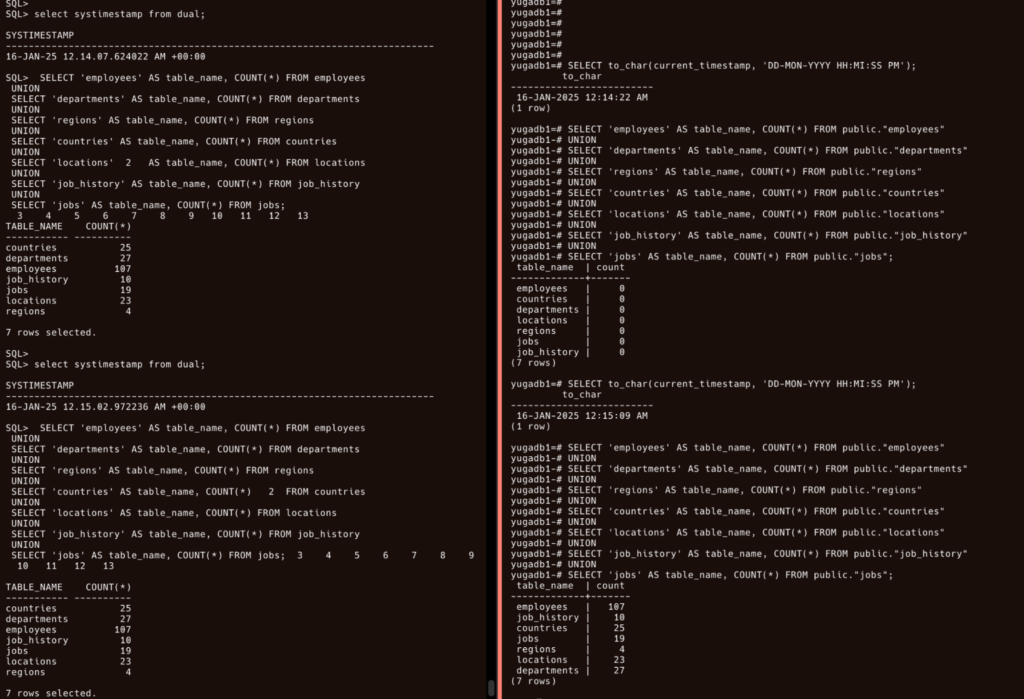
Success! As you can see, our initial data load is complete. Now, we’ll run the real-time replication from the SCN we captured from the source database before starting the real-time extract.
GGSCI> start REP7TAB, aftercsn 3625429 Sending START request to Manager ... Replicat group REP7TAB starting.
This will allow continuous data replication to the target YugabyteDB database from the Oracle database.
Conclusion
This blog showcases how efficiently data can be replicated in real-time between Oracle and YugabyteDB using GoldenGate’s standard configuration and parameters. Customers should follow GoldenGate’s best practices for heterogeneous databases in their environments.
Want to know more about YugabyteDB and Oracle? Check out our recent blog, which details how you can deploy YugabyteDB on Oracle Cloud Infrastructure (OCI).
